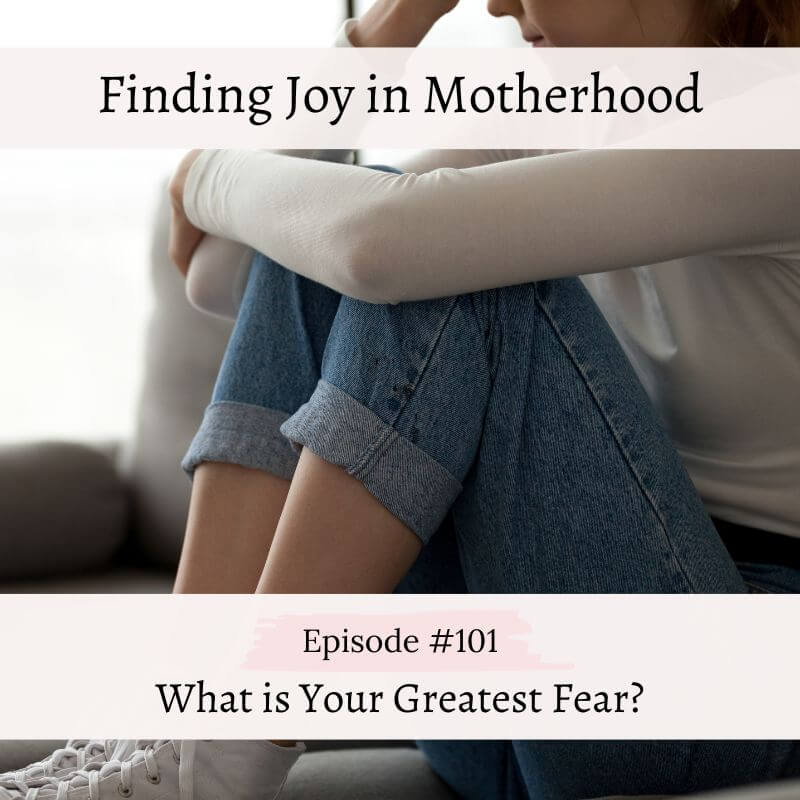Like What You Hear and Want More?
Sign up to join the waitlist for Reimagine Motherhood, my monthly coaching program. I give practical tools and help you make mindset shifts to create the marriage, motherhood, and home you’ve always wanted.
Notes From This Episode:
The Problem
- Fear is a human emotion that’s triggered by a perceived threat.
- It is a basic survival mechanism that signals our bodies to respond to danger with a fight or flight response.
- Most of us do not encounter physical fears, but we do encounter emotional fear.
- Fear is an unpleasant feeling triggered by the perception of danger, real or imagined.
- Fear holds us back from all we want and all we can be.
The Seven Fear Archetypes
- Procrastinator
- People who are afraid of making mistakes, so they procrastinate.
- They’re afraid that if something isn’t perfect, they’ll be judged as either not perfect or not enough.
- Rule Follower
- People who are afraid of not doing things the way they’re supposed to be done.
- People Pleaser
- People who fear what other people will think, that what you say or do will be judged harshly, and that people won’t like you or you’ll let people down.
- Outcast
- People who are most afraid of rejection.
- Often, these people reject others before there’s a chance of being rejected.
- This fear prevents you from actually being truly intimate with others; it alienates you.
- Self-Doubter
- People who are afraid they are not enough or who worry too much about making a mistake.
- Excuse Maker
- People who are most afraid of taking responsibility.
- Pessimist
- People who are most afraid of adversity.
The Gifts of Each Archetype
- Procrastinator – you produce high-quality work.
- Rule Follower – you’re someone who is trustworthy and responsible.
- People Pleaser – you’re usually well-liked and fun to be around.
- Outcast – you’re usually self-motivated and driven to success.
- Self-Doubter – you usually go above and beyond to do a good job.
- Excuse Maker – you’re often a good team player and a keen observer.
- Pessimist – you’re usually sensitive and big-hearted, and you tend to be very caring and compassionate.
Knowing who we are allows us to make the choices that serve us.
Emotions
- Emotions are always created by a thought, but it’s not always a conscious thought, and certainly not always a deliberate thought.
- Without even realizing it, we often choose and emotion that doesn’t serve us. These are called Indulgent Emotions.
- Confusion, Overwhelm, Guilt, Emotional exhaustion, Worry, Boredom, Fear.
- There is no upside to allowing indulgent emotions – they don’t serve us. They only keep us in an agitated state.
- If emotions are fuel for our actions, what types of actions will come from fear? Nothing positive.
- No actions that contribute to our happiness will come from indulging the emotion of fear.
Fear as an Indulgent Emotion
- We’ve become so used to an indulgent emotion, like fear, that we actually choose to feel the negative emotion.
- Fear feels safe because we’ve experienced it or chosen it.
- This is monumentally destructive to our life.
- We no longer see that the fear is not real, and we live in an irrational state, and we completely give up control for our happiness.
Three Ways Emotions Happen in Our Brain
- You feel an emotion without your cognitive awareness, without thinking it, you don’t know what thought is causing it or the reason you are feeling this way.
- You feel an emotion and you know the thought, the reason, but the thought is not deliberate.
- You feel an emotion because of a deliberate thought that creates the emotion or that feeling.
- This could be an indulgent thought, creating a negative emotion, or a deliberate thought, creating a wanted emotion.
Processing Emotions
- The only way we will actually be free of an emotion.
- You have to allow it.
- Come to a place and an awareness of what you’re feeling, ask the Holy Spirit to help you feel it and release it. As soon as you can observe and describe the emotion, you will feel yourself soften, accept it without judgment and notice it.
- Create the wanted and needed emotion.
- We do this through deliberate thought, momentum in our actions, practicing and rehearsing the emotions that we want, and believing and committing to the process.
- What are the feelings you want to create?
- Stop being the victim in your story.
- Your circumstances aren’t causing you fear, it’s your thoughts about your circumstances.
- Just because you think it, doesn’t make it true.
- You have the option to create a new thought about your circumstances, and then your thoughts will create your feelings.
Final Considerations
- Journal for five minutes, write down the things that you are afraid of.
- Spend some time asking yourself, doing a thought download, writing it down.
- What might it cost me if I hold onto this fear?
- It could be costing you everything that is wonderful and beautiful and joyful in your life.

